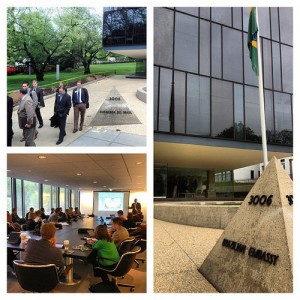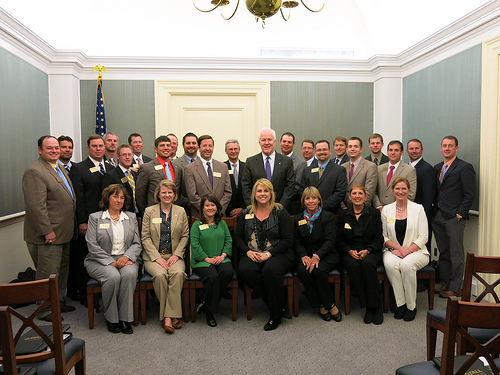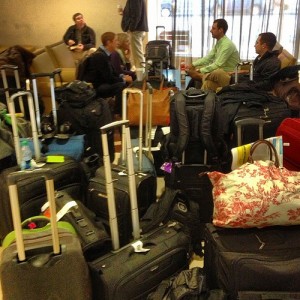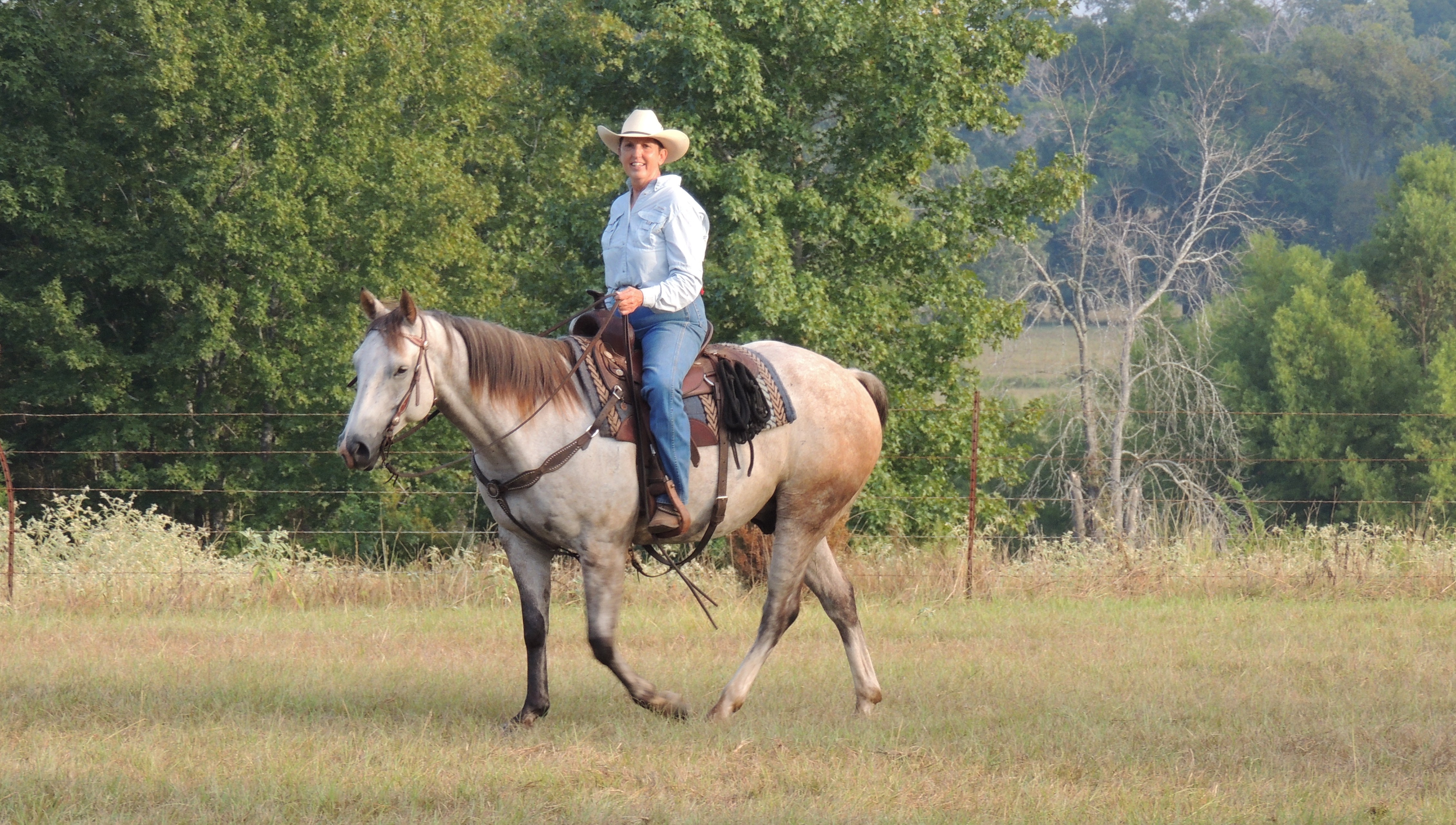April 23, 2013 – Day 2
(Pictures by Lindsay Kennedy)
Brazilian Embassy – Horrys Friaca – Agricultural Attache’
 Brazil is the 5th largest country in the world – 5th largest population – 7th largest economy. In 2009 the exports to the US were 159 billion and they imported 136 billion. Almost 50% is Amazon Biome – forest; no agriculture. Pasture lands occupy nearly 70% of the total area dedicated to ag production. Pasture productivity is still low – around 1 head per hectare (2.4 acres). Agricultural production started primarily in the southern region – expanded to other areas toward the mid-west of the country. The country invested in tropical technology to allow coexistence of food and energy production. Worldwide leading products such as beef, soybean, sugar, poultry and coffee account for the majority of production. Recently corn has increased for ethanol. EU – then China – then the US are the leading recipients of their exports. The positive results of the Brazilian trade balance rely on agriculture – 54.8 billion in agribusiness. Domestic consumption ranking – ethanol – beef – corn. Brazil can harvest two crops in one year. Soybeans then corn – double cropping. The largest corn export partner is Iran.Brazil is worldwide leading supplier of both beef and Halal beef. Russia is currently biggest recipient. Most of their poultry goes to Saudi Arabia. Russia takes largest share of pork – then Hong Kong. Another growth area is sugarcane which can be transformed to sugar and ethanol. The largest export of sugar is to India. The top importers of ethanol is the EU – Japan – South Korea. Almost half of the sources of the Brazilian energy matrix are renewable – sugarcane being the second most important one. Oil and oil products still lead – but only at 38%. Currently 10 million cars in Brazil have flex-fuel engines. Brazil is the world’s leading exporter of coffee. Their investment in technology has increased production by 26% while production area has decreased 38%. Top destinations for coffee is the EU – then the US (total 3.7 billion).
Brazil is the 5th largest country in the world – 5th largest population – 7th largest economy. In 2009 the exports to the US were 159 billion and they imported 136 billion. Almost 50% is Amazon Biome – forest; no agriculture. Pasture lands occupy nearly 70% of the total area dedicated to ag production. Pasture productivity is still low – around 1 head per hectare (2.4 acres). Agricultural production started primarily in the southern region – expanded to other areas toward the mid-west of the country. The country invested in tropical technology to allow coexistence of food and energy production. Worldwide leading products such as beef, soybean, sugar, poultry and coffee account for the majority of production. Recently corn has increased for ethanol. EU – then China – then the US are the leading recipients of their exports. The positive results of the Brazilian trade balance rely on agriculture – 54.8 billion in agribusiness. Domestic consumption ranking – ethanol – beef – corn. Brazil can harvest two crops in one year. Soybeans then corn – double cropping. The largest corn export partner is Iran.Brazil is worldwide leading supplier of both beef and Halal beef. Russia is currently biggest recipient. Most of their poultry goes to Saudi Arabia. Russia takes largest share of pork – then Hong Kong. Another growth area is sugarcane which can be transformed to sugar and ethanol. The largest export of sugar is to India. The top importers of ethanol is the EU – Japan – South Korea. Almost half of the sources of the Brazilian energy matrix are renewable – sugarcane being the second most important one. Oil and oil products still lead – but only at 38%. Currently 10 million cars in Brazil have flex-fuel engines. Brazil is the world’s leading exporter of coffee. Their investment in technology has increased production by 26% while production area has decreased 38%. Top destinations for coffee is the EU – then the US (total 3.7 billion).
The Amazon Biome is protected by law – like our Federal reserves. Satellite monitoring controls the region to ensure the Rain Forest protection. In the Amazon Biome the government does not help you take care of the 80% you must reserve. It is mandatory to preserve river banks, areas around lagoons, lakes or water reservoirs, peaks, among other things – all at your own expense. You are also required to plant grass along the river banks.
The US does not consider Brazil a threat to our agricultural. In the cattle industry – they are not free of foot and mouth disease – in most instances vaccinations are optional – so they have to export to less “picky” markets – ones without as many requirements as the US.
US Senator John Cornyn
 Money is an issue – our Senator is a strong advocate for reducing taxes and reducing spending. There is currently some movement to address immigration reform. We need a legal work force in agriculture. We do not want to choke our bi-lateral trade – legitimate trade needs to continue. Endangered species is another issue. Able to work out compromise for oil/gas and the environmentalist to deal with the “lizard”. Now working on the lessor prairie chicken.
Money is an issue – our Senator is a strong advocate for reducing taxes and reducing spending. There is currently some movement to address immigration reform. We need a legal work force in agriculture. We do not want to choke our bi-lateral trade – legitimate trade needs to continue. Endangered species is another issue. Able to work out compromise for oil/gas and the environmentalist to deal with the “lizard”. Now working on the lessor prairie chicken.
Believes in our gun rights. Does not feel guns are the issue – it is a mental health issue. He is for free trade agreements – current administration is not interested unless they pacify labor or the environmentalist. He is our senior Senator now. He has not seen a time when our country and our government is more polarized. The media does take positions – don’t listen to one media source – gather information from several sources. Much of the rhetoric is more visible and louder. We must compromise on some issues – not on our principles.
US Grains Council – Ms. Lyndsey Erb-Sharkey (Membership Outreach Manager) and Mr. Erick Erickson (Director of Global Strategies)
95% of the world population lives outside the US. Three fantastic things: growing middle class in developing countries – productive capacity of US agriculture combining science, technology and management – the power of trade to match purchasing power with productive capacity: the great opportunity for agriculture. We are not in a spectator sport. We have to teach – promote – be advocates to facilitate – provide information and open channels. There is a new voice – a new face to the consumer. We need to speak with passion.
The US Grains Council has a mission to connect those that produce to consumers all over the world. They represent corn, sorghum, barley. They currently represent 26 States and 115 Agribusinesses. They exist to work on expanding exports. Currently working on the Farm Bill- winning the battle for US exports. We must fight to participate in the global market place. Partnerships are the way we get things done – private sector – producer – market place – our government – different ag organizations and alliances – even our competitors. The Export Exchange brings buyers and sellers together. An open line of communication is what helps us resolve problems. The drought hurt our corn production – it allowed other countries to compete on a greater scale than ever before. We can’t control the weather – we will have to reclaim our markets when our production returns. The world still trusts our quality and food safety. The hard part is price which is the great equalizer.
Future is the phenomenal growth in global middle class – parallel growth of competition – allure of policies that may stifle trade – lack of attention to the global perspective – lack of information – gaps/breakdown in communication.
We must support MAP(Market Access Program) and FMD(Foreign Market Development). As producers we must support our associations. Ask “how can I play in the global market?”
Note: The Grains Council actually started in Texas over 50 years ago!!
Mr. Dave Langdon – Senior Economist in the Office of the Chief Economist within the US Department of Commerce’s Economics and Statistics Administration (ESA)
As for current events – we are in a sustained recovery with the sequestration acting as a drag. We are not on a steady path – our gross domestic product is up and down. Private payroll employment has been growing consistently. The private sector has added 6.5 million jobs. The unemployment rate has decreased to 7.6%. If you considered those not looking for a job – part time who want a full time job – unemployment would be up around 14%. Around 1 million “discouraged workers”. Texas has 2% unemployment.
Stock market indices are much stronger in US than other parts of the world. Other governments are not stable.
2/3 of our economy is represented by our consumers – buying – selling. Consumer confidence and sentiment is measured. How do you feel about the economy – the government? How we feel affects our spending – our confidence in the future. Interest rates are low – car buying is up.
Our government is the drag on the growth of our economy – government spending in the military sector has been declining. State and local government jobs are being reduced – Texas has reduced 0 to 5%. Obama has committed to foreign GDP growth in select countries – Brazil – Canada – Mexico – India – China. We are having growth in new orders for exports – cars, farm machinery.
Housing market is experiencing a turn-around. That spills over into construction jobs – furniture production – all aspects of housing. Housing starts in Texas are at an all time high. Oil and natural production in Texas is an incredible story – provides stability and dollars back into all segments of Texas economy. A household spends approximately $3500 a year on gasoline.
Over 60 million people visit the US each year – Mexico, Canada, UK, Japan.
Go to census.gov for all questions. Houston largest growth city in Texas. Dallas – Ft. Worth metro-plex strongest growth area. Lubbock, Texas showing strong growth compared to US average.
Mr. Bart Fischer – Chief Economist, Committee on Agriculture, US House of Representatives
Mr. Matt Schertz – Senior Professional Staff for Commodity Policy and Crop Insurance, Committee on Agriculture, US House of Representatives
Farm Bill process started back in 2011. Still no Farm Bill. The Super Committee was created to “help” put forward a proposal from a bi-partisan position. Neither House nor Senate was marking up a bill – no floor time. Finally able to come together – submitted a 5 year plan – 4 hours later the Super Committee fell apart. Tough environment. We need drastic changes. No one is willing to make the hard decisions – make the program cuts. Need 218 votes to get anything done. In 2012 the Senate was able to get a Farm Bill across the floor. With upcoming elections – no one wanted to vote for a Bill loaded with entitlements (80% Food and nutrition entitlements).
Federal budget is based on current behavior – don’t change anything – just put the same practices out there for the next ten years. We are currently 16.5 trillion in debt. And the plan is to just keep doing what we are doing. That’s their idea for a budget!!! Can you imagine??
The Farm Bill is finally being marked up – scheduled for May 15th. It has to be a bill that covers all commodities – fair to everyone. Crop insurance is the key element. Programs and funding to encourage young farmers is also part of this bill – needed to address the aging farm community. Farm Bills are written to cover the difficult times – people need to understand this.
Congressman Bill Flores – US House of Representatives, 17th Congressional District of Texas 
He wanted to welcome us to fantasy land!! The Keystone Pipeline should be a no brainer. Part of the problem is a lack of energy policy. We need a clear strategy to be energy independent with environment protection clear– nuclear power for electricity – carbon fuels are a big part of our foot print and will be for the next several decades so let’s use the revenues to build infra-structure for renewable processes – we can’t cut the private market out of the solution – focus on alternative fuels but only when they are ready for consumption. If it is not efficient – why push it – it must pay out or the consumer can’t buy into it. He believes that we should not use any product for bio-fuel that we use for food. Hydraulic fracturing has allowed us to tap into oil and gas that we could not have recovered in times past. One of the problems is the use of 1 million gallons of water needed to “frac”. The endangered species act should not be put ahead of people. We must find a way to protect our environment – not hurt our economy – put people first!! Another issue is the Ocean Zoning Proposal – zone the oceans and the sources thereof. Any stream that contributes – flows – moves toward the ocean would be controlled by the Federal Government.
Congressman Randy Neugebauer – US House of Representatives, 19th Congressional District of Texas
“Trade, Farm Bill, Housing and Insurance” Another debt ceiling crisis in a few months. Immigration reform capturing everyone’s attention right now. The events of Boston will add new elements to this debate – who is an enemy combatant? – who should be allowed in this country? He believes that the Farm Bill will be re-introduced and advanced. We need reform of the SNAP program. If we are going to cut the farm aspects – we need to cut the SNAP program as well. He has a little red wagon in his office – Are you pulling or are you riding?
Congressman Pete Gallego – US House of Representative, 23rd Congressional District of Texas
“Immigration, Labor, Homeland Security and Current Issues Facing US Agriculture”
He believes our representation has become a “controlled” democracy. From your first day you are separated – Republican? – Democrat? Not unified in any way – very frustrating. 800 miles of border in his district –and takes in San Antonio. Immigration is a huge issue for him. Agriculture needs people to work on the farms. He wants the path to citizenship – it is not amnesty. We should allow the person that has worked hard – not gotten in any trouble – willing to pay a fine and back taxes – have an American to vouch for them – to become an American citizen. He is disillusioned that our government is not really representing the people. There are three parties – Tea Party – Republican – Democrat – and it is about the party agenda – not the people. The majority of the majority has to support something before it gets out on the floor. It is really hard to get anything done. People are going to have to stop worrying about re-election – vote what is right. If Texas ever goes Democrat – game over. Congressman Gallego is Democrat – but believes his job is to vote according to his constituency.
Question: Do you think if we stopped entitlements these people would take farm jobs? He believed we have lost work ethic generationally. No – Americans are not going to take farm jobs.
Republicans need to look at this immigration reform – stop calling the Mexican population “aliens”. Reality is that we need reform – work on the issue – stop the bias and get back to democratic representation. This is our country – participate – vote!! It is the vocal minority that puts us in the ditch. What does the majority really want? Then unify and speak out!!!
It was two very intense days of information and opinion. Over and over I heard that the ag community (all aspects of agriculture and the associations that represent us) are not unified – we do not have a strong voice – we are in the trenches fighting our battles and losing the war.
From the Capitol we left for the Ford Theatre for an enjoyable evening of “Hello Dolly!” The theatre alone was filled with such history and presence of times past. It was a great evening. And with the close of that curtain – so did our time in Washington D.C. come to a close.





Leave a Reply